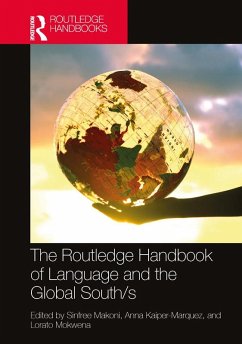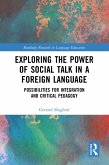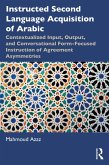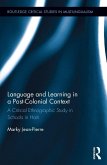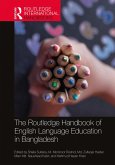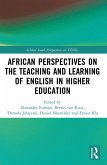The Routledge Handbook of Language and the Global South/s (eBook, ePUB)
Redaktion: Makoni, Sinfree; Mokwena, Lorato; Kaiper-Marquez, Anna
46,95 €
46,95 €
inkl. MwSt.
Sofort per Download lieferbar

23 °P sammeln
46,95 €
Als Download kaufen

46,95 €
inkl. MwSt.
Sofort per Download lieferbar

23 °P sammeln
Jetzt verschenken
Alle Infos zum eBook verschenken
46,95 €
inkl. MwSt.
Sofort per Download lieferbar
Alle Infos zum eBook verschenken

23 °P sammeln
The Routledge Handbook of Language and the Global South/s (eBook, ePUB)
Redaktion: Makoni, Sinfree; Mokwena, Lorato; Kaiper-Marquez, Anna
- Format: ePub
- Merkliste
- Auf die Merkliste
- Bewerten Bewerten
- Teilen
- Produkt teilen
- Produkterinnerung
- Produkterinnerung

Bitte loggen Sie sich zunächst in Ihr Kundenkonto ein oder registrieren Sie sich bei
bücher.de, um das eBook-Abo tolino select nutzen zu können.
Hier können Sie sich einloggen
Hier können Sie sich einloggen
Sie sind bereits eingeloggt. Klicken Sie auf 2. tolino select Abo, um fortzufahren.

Bitte loggen Sie sich zunächst in Ihr Kundenkonto ein oder registrieren Sie sich bei bücher.de, um das eBook-Abo tolino select nutzen zu können.
This handbook centers on language(s) in the Global South/s and the many ways in which both "language" and the "Global South" are conceptualized, theorized, practiced, and reshaped.
- Geräte: eReader
- ohne Kopierschutz
- eBook Hilfe
- Größe: 10.37MB
Andere Kunden interessierten sich auch für
![Language Policy and the Future of Europe (eBook, ePUB) Language Policy and the Future of Europe (eBook, ePUB)]() Alice LealLanguage Policy and the Future of Europe (eBook, ePUB)21,95 €
Alice LealLanguage Policy and the Future of Europe (eBook, ePUB)21,95 €![Heritage Language Policies around the World (eBook, ePUB) Heritage Language Policies around the World (eBook, ePUB)]() Heritage Language Policies around the World (eBook, ePUB)44,95 €
Heritage Language Policies around the World (eBook, ePUB)44,95 €![Exploring the Power of Social Talk in a Foreign Language (eBook, ePUB) Exploring the Power of Social Talk in a Foreign Language (eBook, ePUB)]() Gerrard MugfordExploring the Power of Social Talk in a Foreign Language (eBook, ePUB)42,95 €
Gerrard MugfordExploring the Power of Social Talk in a Foreign Language (eBook, ePUB)42,95 €![Instructed Second Language Acquisition of Arabic (eBook, ePUB) Instructed Second Language Acquisition of Arabic (eBook, ePUB)]() Mahmoud AzazInstructed Second Language Acquisition of Arabic (eBook, ePUB)34,95 €
Mahmoud AzazInstructed Second Language Acquisition of Arabic (eBook, ePUB)34,95 €![Language and Learning in a Post-Colonial Context (eBook, ePUB) Language and Learning in a Post-Colonial Context (eBook, ePUB)]() Marky Jean-PierreLanguage and Learning in a Post-Colonial Context (eBook, ePUB)52,95 €
Marky Jean-PierreLanguage and Learning in a Post-Colonial Context (eBook, ePUB)52,95 €![The Routledge Handbook of English Language Education in Bangladesh (eBook, ePUB) The Routledge Handbook of English Language Education in Bangladesh (eBook, ePUB)]() The Routledge Handbook of English Language Education in Bangladesh (eBook, ePUB)46,95 €
The Routledge Handbook of English Language Education in Bangladesh (eBook, ePUB)46,95 €![African Perspectives on the Teaching and Learning of English in Higher Education (eBook, ePUB) African Perspectives on the Teaching and Learning of English in Higher Education (eBook, ePUB)]() African Perspectives on the Teaching and Learning of English in Higher Education (eBook, ePUB)41,95 €
African Perspectives on the Teaching and Learning of English in Higher Education (eBook, ePUB)41,95 €-
-
-
This handbook centers on language(s) in the Global South/s and the many ways in which both "language" and the "Global South" are conceptualized, theorized, practiced, and reshaped.
Dieser Download kann aus rechtlichen Gründen nur mit Rechnungsadresse in A, B, BG, CY, CZ, D, DK, EW, E, FIN, F, GR, HR, H, IRL, I, LT, L, LR, M, NL, PL, P, R, S, SLO, SK ausgeliefert werden.
Produktdetails
- Produktdetails
- Verlag: Taylor & Francis eBooks
- Seitenzahl: 514
- Erscheinungstermin: 25. August 2022
- Englisch
- ISBN-13: 9781000600193
- Artikelnr.: 64376174
- Verlag: Taylor & Francis eBooks
- Seitenzahl: 514
- Erscheinungstermin: 25. August 2022
- Englisch
- ISBN-13: 9781000600193
- Artikelnr.: 64376174
- Herstellerkennzeichnung Die Herstellerinformationen sind derzeit nicht verfügbar.
Sinfree Makoni is Professor in Applied Linguistics and African Studies at Pennsylvania State University, USA. He has published extensively on language policy and planning, health communication, and decoloniality and southern epistemologies. His recent book co-authored with Alistair Pennycook, Innovations and Challenges in Applied Linguistics from the Global South, was shortlisted by the British Association of Applied Linguistics. Anna Kaiper-Marquez is an Associate Director and Assistant Teaching Professor at the Institute for the Study of Adult Literacy and the Goodling Institute for Research in Family Literacy at Pennsylvania State University, USA. Her research interests include adult literacy, English language learning, and domestic work worldwide. Lorato Mokwena is based in the Linguistics Department at the University of the Western Cape, South Africa. Her research passion involves linguistic landscape with a niche focus on orality. Her latest publication explored how the use of oral route directions problematizes the conceptual distinction between "urban" and "rural" spaces.
Table of Contents
Handbook of Language and the Global South/s
* Preface by Lynn Mario T. Menezes de Souza
* Introduction by Sinfree Makoni, Anna Kaiper-Marquez, Lorato Mokwena
* Theme #1: History, Politics, and Social Engagement in the Global
South
Chapter 1
* Languaging Hope: The Transgressive Temporality of Marielle Franco in
Brazil by Samiha Khalil, Daniel Silva, Jerry Won Lee
Chapter 2
* Epistemology of Knowledge in Medieval Islamic Scientific Discourse:
Biruni's Treatment of Subjectivity, Relativity, and Uncertainty by
Esmat Babaii
Chapter 3
* From Order-of-Language to Provincializing language by Cecile Canut
Chapter 4
* Civic Participation as a Travelling Ideoscape: Which Direction? By
Giovanni Allegretti, Marco Meloni, Begona Dorronsoro
* Interlude #1: Conversation with Jean Comaroff and Jane Gordon
* Theme #2: Indigenous Languages
Chapter 5
* Co-Conspiring with Land: What Decolonizing with Indigenous Land and
Language Have to Teach Us by Mary Hermes, Mel Engman, Anna Schick
Chapter 6
* "We Tell the River, 'Give Me Back My Piece of Soul and I Give You
Back Your Pebble'": The Onto-epistemology and Language of the Ayuk
Ethnic Group in Oaxaca, Mexico by Mario E. López-Gopar, William M.
Sughrua, Cosme Gregorio Cirilo & Lorena Córdova Hernández
Chapter 7
* Discourses of Endangerment and Appropriations of the "Indigenous":
What Indigeneity Means in Non-Indigenous Spaces by Quentin Boitel
* Theme #3: South-South Dialogue
Chapter 8
* 'The language I speak is the language I speak': Re-centering
multilingual language practices in situations of risk through a
sociolinguistics of the South by Necia Stanford-Billinghurst
Chapter 9
* English and the Dissemination of Local Knowledges: A problematic for
South-South Dialogue by Hamza R'boul
Chapter 10
* Multilingualism in a Decolonial Way: A Gaze from the Ryukyus by
Madoka Hammine
Chapter 11
* Tensions within development ontologies in Botswana: A case of the San
by Keneilwe Molosi-France
* Interlude #2: Conversation with Diana Jeater
* Theme #4: Race and Language: Critical Race Theories and Southern
Theories.
Chapter 12
* Race and Slavery Entextualizations in Contemporary Ads in the
Brazilian Context by Glenda Cristina Valim de Melo
Chapter 13
* Language Practices in Afro-Brazilian Religions: On Legitrinmacy, Oral
Tradition, and Racial Issues by Cristine G. Severo, Ana Cláudia F.
Eltermann, and Sinfree Makoni
Chapter 14
* For a Critical Applied Linguistics Articulated to the Praxiology of
Hope by Kleber Aparecido da Silva, Helenice Joviano Roque-Faria,
Rosana Helena Nunes, Lauro Sérgio Machado Pereira, Renata Mourão
Guimarães, and Dllubia Santclair
* Theme #5: Language, Gender, Sex, and Sexuality
Chapter 15
* Affective practice in language and sexuality research methodologies
at North/South intersections: Narrative, dissonance and reflexivity
by Benedict J.L. Rowlett
Chapter 16
* Perfect Muslim bhadramahila / Lady: Decoloniality in/ as Praxis by
Shaila Sultana
Chapter 17
* Bodies, Languages, and Material Conditions Governing the Interaction
by Joana Plaza Pinto
Chapter 18
* Colonial intertexts and black femininities: Locating black African
women in a racialized iconography of knowledge by Busi Makoni
* Interlude #3: Conversation with Busi Makoni
* Theme #6: Language, the Global South, and the "Family"
Chapter 19
* Southern Approaches to Family Multilingualism by Rafael Lomeu Gomes &
Elizabeth Lanza
Chapter 20
* Language Maintenance and the Transmission of Ideologies among
Chinese-Malaysian Families by Teresa Ong and Selim Ben Said
Chapter 21
* Expanding "good" mother discourse: Examining motherhood within the
context of Opioid Use Disorder by Tabitha Stickel, Brandn Green,
Kristal Jones
* Theme #7: Language in the Classroom Context
Chapter 22
* Defying the abyssal line: Towards el Buenvivir in English language
teaching in Colombia by Yecid Ortega
Chapter 23
* Representation of Afro-descendants in a Primary School Lesson Plan in
Buenos Aires by Antonela Soledad Vaccaro
Chapter 24
* Southern Visions of Language policy: Re-visioning Mother Tongue based
Bilingual Ed in Ghana by Mama Adobea Adjetey-Nii Owoo
1. Interlude #4: Conversation with Ophelia Garcia
2. Theme #8: Towards Multiple Language Ontologies and Southern
Multilingualisms
* Philosophical/theoretical developments:
Chapter 25
* On Naming Traditions: Losing sight of communicative and democratic
agendas when language is loose inside and outside
institutional-scapes by Sangeeta Bagga Gupta
Chapter 26
* Palimpset of Tangled Dramas: Language and Education Beyond
Institutional Formations by Desmond Ikenna Odugu
Chapter 27
* Anangu literacy practices unsettle northern models of literacy by
Janet Armitage
* Land and Nature
Chapter 28
* Beyond the 'linguistic' and 'signboard' - Expanding the repertoire of
linguistic landscape signage to include sparsely populated areas in
South Africa by Lorato Mokwena
Chapter 29
* Abstract Critical Thinking, Language and School Vegetable Gardens:
Improving the Cacaio garden of education and prais by Atila Torres
Calvente
* Technology
Chapter 30
* (Written) Online Multilingualism in Technology Mediated
Communication: Appropriating and Remixing Digital Literacies and
Technolinguistic Repertoires by Sibusiso Cliff Ndlangamandla
* Migration and Power
Chapter 31
* Dismantling power relations in refugee service: Funds of knowledge as
resistive power by Cassie Leymarie, Mary Bohn
* Afterword: Reflecting and Refracting the South by Ana Deumert
* Index
Handbook of Language and the Global South/s
* Preface by Lynn Mario T. Menezes de Souza
* Introduction by Sinfree Makoni, Anna Kaiper-Marquez, Lorato Mokwena
* Theme #1: History, Politics, and Social Engagement in the Global
South
Chapter 1
* Languaging Hope: The Transgressive Temporality of Marielle Franco in
Brazil by Samiha Khalil, Daniel Silva, Jerry Won Lee
Chapter 2
* Epistemology of Knowledge in Medieval Islamic Scientific Discourse:
Biruni's Treatment of Subjectivity, Relativity, and Uncertainty by
Esmat Babaii
Chapter 3
* From Order-of-Language to Provincializing language by Cecile Canut
Chapter 4
* Civic Participation as a Travelling Ideoscape: Which Direction? By
Giovanni Allegretti, Marco Meloni, Begona Dorronsoro
* Interlude #1: Conversation with Jean Comaroff and Jane Gordon
* Theme #2: Indigenous Languages
Chapter 5
* Co-Conspiring with Land: What Decolonizing with Indigenous Land and
Language Have to Teach Us by Mary Hermes, Mel Engman, Anna Schick
Chapter 6
* "We Tell the River, 'Give Me Back My Piece of Soul and I Give You
Back Your Pebble'": The Onto-epistemology and Language of the Ayuk
Ethnic Group in Oaxaca, Mexico by Mario E. López-Gopar, William M.
Sughrua, Cosme Gregorio Cirilo & Lorena Córdova Hernández
Chapter 7
* Discourses of Endangerment and Appropriations of the "Indigenous":
What Indigeneity Means in Non-Indigenous Spaces by Quentin Boitel
* Theme #3: South-South Dialogue
Chapter 8
* 'The language I speak is the language I speak': Re-centering
multilingual language practices in situations of risk through a
sociolinguistics of the South by Necia Stanford-Billinghurst
Chapter 9
* English and the Dissemination of Local Knowledges: A problematic for
South-South Dialogue by Hamza R'boul
Chapter 10
* Multilingualism in a Decolonial Way: A Gaze from the Ryukyus by
Madoka Hammine
Chapter 11
* Tensions within development ontologies in Botswana: A case of the San
by Keneilwe Molosi-France
* Interlude #2: Conversation with Diana Jeater
* Theme #4: Race and Language: Critical Race Theories and Southern
Theories.
Chapter 12
* Race and Slavery Entextualizations in Contemporary Ads in the
Brazilian Context by Glenda Cristina Valim de Melo
Chapter 13
* Language Practices in Afro-Brazilian Religions: On Legitrinmacy, Oral
Tradition, and Racial Issues by Cristine G. Severo, Ana Cláudia F.
Eltermann, and Sinfree Makoni
Chapter 14
* For a Critical Applied Linguistics Articulated to the Praxiology of
Hope by Kleber Aparecido da Silva, Helenice Joviano Roque-Faria,
Rosana Helena Nunes, Lauro Sérgio Machado Pereira, Renata Mourão
Guimarães, and Dllubia Santclair
* Theme #5: Language, Gender, Sex, and Sexuality
Chapter 15
* Affective practice in language and sexuality research methodologies
at North/South intersections: Narrative, dissonance and reflexivity
by Benedict J.L. Rowlett
Chapter 16
* Perfect Muslim bhadramahila / Lady: Decoloniality in/ as Praxis by
Shaila Sultana
Chapter 17
* Bodies, Languages, and Material Conditions Governing the Interaction
by Joana Plaza Pinto
Chapter 18
* Colonial intertexts and black femininities: Locating black African
women in a racialized iconography of knowledge by Busi Makoni
* Interlude #3: Conversation with Busi Makoni
* Theme #6: Language, the Global South, and the "Family"
Chapter 19
* Southern Approaches to Family Multilingualism by Rafael Lomeu Gomes &
Elizabeth Lanza
Chapter 20
* Language Maintenance and the Transmission of Ideologies among
Chinese-Malaysian Families by Teresa Ong and Selim Ben Said
Chapter 21
* Expanding "good" mother discourse: Examining motherhood within the
context of Opioid Use Disorder by Tabitha Stickel, Brandn Green,
Kristal Jones
* Theme #7: Language in the Classroom Context
Chapter 22
* Defying the abyssal line: Towards el Buenvivir in English language
teaching in Colombia by Yecid Ortega
Chapter 23
* Representation of Afro-descendants in a Primary School Lesson Plan in
Buenos Aires by Antonela Soledad Vaccaro
Chapter 24
* Southern Visions of Language policy: Re-visioning Mother Tongue based
Bilingual Ed in Ghana by Mama Adobea Adjetey-Nii Owoo
1. Interlude #4: Conversation with Ophelia Garcia
2. Theme #8: Towards Multiple Language Ontologies and Southern
Multilingualisms
* Philosophical/theoretical developments:
Chapter 25
* On Naming Traditions: Losing sight of communicative and democratic
agendas when language is loose inside and outside
institutional-scapes by Sangeeta Bagga Gupta
Chapter 26
* Palimpset of Tangled Dramas: Language and Education Beyond
Institutional Formations by Desmond Ikenna Odugu
Chapter 27
* Anangu literacy practices unsettle northern models of literacy by
Janet Armitage
* Land and Nature
Chapter 28
* Beyond the 'linguistic' and 'signboard' - Expanding the repertoire of
linguistic landscape signage to include sparsely populated areas in
South Africa by Lorato Mokwena
Chapter 29
* Abstract Critical Thinking, Language and School Vegetable Gardens:
Improving the Cacaio garden of education and prais by Atila Torres
Calvente
* Technology
Chapter 30
* (Written) Online Multilingualism in Technology Mediated
Communication: Appropriating and Remixing Digital Literacies and
Technolinguistic Repertoires by Sibusiso Cliff Ndlangamandla
* Migration and Power
Chapter 31
* Dismantling power relations in refugee service: Funds of knowledge as
resistive power by Cassie Leymarie, Mary Bohn
* Afterword: Reflecting and Refracting the South by Ana Deumert
* Index
Table of Contents
Handbook of Language and the Global South/s
* Preface by Lynn Mario T. Menezes de Souza
* Introduction by Sinfree Makoni, Anna Kaiper-Marquez, Lorato Mokwena
* Theme #1: History, Politics, and Social Engagement in the Global
South
Chapter 1
* Languaging Hope: The Transgressive Temporality of Marielle Franco in
Brazil by Samiha Khalil, Daniel Silva, Jerry Won Lee
Chapter 2
* Epistemology of Knowledge in Medieval Islamic Scientific Discourse:
Biruni's Treatment of Subjectivity, Relativity, and Uncertainty by
Esmat Babaii
Chapter 3
* From Order-of-Language to Provincializing language by Cecile Canut
Chapter 4
* Civic Participation as a Travelling Ideoscape: Which Direction? By
Giovanni Allegretti, Marco Meloni, Begona Dorronsoro
* Interlude #1: Conversation with Jean Comaroff and Jane Gordon
* Theme #2: Indigenous Languages
Chapter 5
* Co-Conspiring with Land: What Decolonizing with Indigenous Land and
Language Have to Teach Us by Mary Hermes, Mel Engman, Anna Schick
Chapter 6
* "We Tell the River, 'Give Me Back My Piece of Soul and I Give You
Back Your Pebble'": The Onto-epistemology and Language of the Ayuk
Ethnic Group in Oaxaca, Mexico by Mario E. López-Gopar, William M.
Sughrua, Cosme Gregorio Cirilo & Lorena Córdova Hernández
Chapter 7
* Discourses of Endangerment and Appropriations of the "Indigenous":
What Indigeneity Means in Non-Indigenous Spaces by Quentin Boitel
* Theme #3: South-South Dialogue
Chapter 8
* 'The language I speak is the language I speak': Re-centering
multilingual language practices in situations of risk through a
sociolinguistics of the South by Necia Stanford-Billinghurst
Chapter 9
* English and the Dissemination of Local Knowledges: A problematic for
South-South Dialogue by Hamza R'boul
Chapter 10
* Multilingualism in a Decolonial Way: A Gaze from the Ryukyus by
Madoka Hammine
Chapter 11
* Tensions within development ontologies in Botswana: A case of the San
by Keneilwe Molosi-France
* Interlude #2: Conversation with Diana Jeater
* Theme #4: Race and Language: Critical Race Theories and Southern
Theories.
Chapter 12
* Race and Slavery Entextualizations in Contemporary Ads in the
Brazilian Context by Glenda Cristina Valim de Melo
Chapter 13
* Language Practices in Afro-Brazilian Religions: On Legitrinmacy, Oral
Tradition, and Racial Issues by Cristine G. Severo, Ana Cláudia F.
Eltermann, and Sinfree Makoni
Chapter 14
* For a Critical Applied Linguistics Articulated to the Praxiology of
Hope by Kleber Aparecido da Silva, Helenice Joviano Roque-Faria,
Rosana Helena Nunes, Lauro Sérgio Machado Pereira, Renata Mourão
Guimarães, and Dllubia Santclair
* Theme #5: Language, Gender, Sex, and Sexuality
Chapter 15
* Affective practice in language and sexuality research methodologies
at North/South intersections: Narrative, dissonance and reflexivity
by Benedict J.L. Rowlett
Chapter 16
* Perfect Muslim bhadramahila / Lady: Decoloniality in/ as Praxis by
Shaila Sultana
Chapter 17
* Bodies, Languages, and Material Conditions Governing the Interaction
by Joana Plaza Pinto
Chapter 18
* Colonial intertexts and black femininities: Locating black African
women in a racialized iconography of knowledge by Busi Makoni
* Interlude #3: Conversation with Busi Makoni
* Theme #6: Language, the Global South, and the "Family"
Chapter 19
* Southern Approaches to Family Multilingualism by Rafael Lomeu Gomes &
Elizabeth Lanza
Chapter 20
* Language Maintenance and the Transmission of Ideologies among
Chinese-Malaysian Families by Teresa Ong and Selim Ben Said
Chapter 21
* Expanding "good" mother discourse: Examining motherhood within the
context of Opioid Use Disorder by Tabitha Stickel, Brandn Green,
Kristal Jones
* Theme #7: Language in the Classroom Context
Chapter 22
* Defying the abyssal line: Towards el Buenvivir in English language
teaching in Colombia by Yecid Ortega
Chapter 23
* Representation of Afro-descendants in a Primary School Lesson Plan in
Buenos Aires by Antonela Soledad Vaccaro
Chapter 24
* Southern Visions of Language policy: Re-visioning Mother Tongue based
Bilingual Ed in Ghana by Mama Adobea Adjetey-Nii Owoo
1. Interlude #4: Conversation with Ophelia Garcia
2. Theme #8: Towards Multiple Language Ontologies and Southern
Multilingualisms
* Philosophical/theoretical developments:
Chapter 25
* On Naming Traditions: Losing sight of communicative and democratic
agendas when language is loose inside and outside
institutional-scapes by Sangeeta Bagga Gupta
Chapter 26
* Palimpset of Tangled Dramas: Language and Education Beyond
Institutional Formations by Desmond Ikenna Odugu
Chapter 27
* Anangu literacy practices unsettle northern models of literacy by
Janet Armitage
* Land and Nature
Chapter 28
* Beyond the 'linguistic' and 'signboard' - Expanding the repertoire of
linguistic landscape signage to include sparsely populated areas in
South Africa by Lorato Mokwena
Chapter 29
* Abstract Critical Thinking, Language and School Vegetable Gardens:
Improving the Cacaio garden of education and prais by Atila Torres
Calvente
* Technology
Chapter 30
* (Written) Online Multilingualism in Technology Mediated
Communication: Appropriating and Remixing Digital Literacies and
Technolinguistic Repertoires by Sibusiso Cliff Ndlangamandla
* Migration and Power
Chapter 31
* Dismantling power relations in refugee service: Funds of knowledge as
resistive power by Cassie Leymarie, Mary Bohn
* Afterword: Reflecting and Refracting the South by Ana Deumert
* Index
Handbook of Language and the Global South/s
* Preface by Lynn Mario T. Menezes de Souza
* Introduction by Sinfree Makoni, Anna Kaiper-Marquez, Lorato Mokwena
* Theme #1: History, Politics, and Social Engagement in the Global
South
Chapter 1
* Languaging Hope: The Transgressive Temporality of Marielle Franco in
Brazil by Samiha Khalil, Daniel Silva, Jerry Won Lee
Chapter 2
* Epistemology of Knowledge in Medieval Islamic Scientific Discourse:
Biruni's Treatment of Subjectivity, Relativity, and Uncertainty by
Esmat Babaii
Chapter 3
* From Order-of-Language to Provincializing language by Cecile Canut
Chapter 4
* Civic Participation as a Travelling Ideoscape: Which Direction? By
Giovanni Allegretti, Marco Meloni, Begona Dorronsoro
* Interlude #1: Conversation with Jean Comaroff and Jane Gordon
* Theme #2: Indigenous Languages
Chapter 5
* Co-Conspiring with Land: What Decolonizing with Indigenous Land and
Language Have to Teach Us by Mary Hermes, Mel Engman, Anna Schick
Chapter 6
* "We Tell the River, 'Give Me Back My Piece of Soul and I Give You
Back Your Pebble'": The Onto-epistemology and Language of the Ayuk
Ethnic Group in Oaxaca, Mexico by Mario E. López-Gopar, William M.
Sughrua, Cosme Gregorio Cirilo & Lorena Córdova Hernández
Chapter 7
* Discourses of Endangerment and Appropriations of the "Indigenous":
What Indigeneity Means in Non-Indigenous Spaces by Quentin Boitel
* Theme #3: South-South Dialogue
Chapter 8
* 'The language I speak is the language I speak': Re-centering
multilingual language practices in situations of risk through a
sociolinguistics of the South by Necia Stanford-Billinghurst
Chapter 9
* English and the Dissemination of Local Knowledges: A problematic for
South-South Dialogue by Hamza R'boul
Chapter 10
* Multilingualism in a Decolonial Way: A Gaze from the Ryukyus by
Madoka Hammine
Chapter 11
* Tensions within development ontologies in Botswana: A case of the San
by Keneilwe Molosi-France
* Interlude #2: Conversation with Diana Jeater
* Theme #4: Race and Language: Critical Race Theories and Southern
Theories.
Chapter 12
* Race and Slavery Entextualizations in Contemporary Ads in the
Brazilian Context by Glenda Cristina Valim de Melo
Chapter 13
* Language Practices in Afro-Brazilian Religions: On Legitrinmacy, Oral
Tradition, and Racial Issues by Cristine G. Severo, Ana Cláudia F.
Eltermann, and Sinfree Makoni
Chapter 14
* For a Critical Applied Linguistics Articulated to the Praxiology of
Hope by Kleber Aparecido da Silva, Helenice Joviano Roque-Faria,
Rosana Helena Nunes, Lauro Sérgio Machado Pereira, Renata Mourão
Guimarães, and Dllubia Santclair
* Theme #5: Language, Gender, Sex, and Sexuality
Chapter 15
* Affective practice in language and sexuality research methodologies
at North/South intersections: Narrative, dissonance and reflexivity
by Benedict J.L. Rowlett
Chapter 16
* Perfect Muslim bhadramahila / Lady: Decoloniality in/ as Praxis by
Shaila Sultana
Chapter 17
* Bodies, Languages, and Material Conditions Governing the Interaction
by Joana Plaza Pinto
Chapter 18
* Colonial intertexts and black femininities: Locating black African
women in a racialized iconography of knowledge by Busi Makoni
* Interlude #3: Conversation with Busi Makoni
* Theme #6: Language, the Global South, and the "Family"
Chapter 19
* Southern Approaches to Family Multilingualism by Rafael Lomeu Gomes &
Elizabeth Lanza
Chapter 20
* Language Maintenance and the Transmission of Ideologies among
Chinese-Malaysian Families by Teresa Ong and Selim Ben Said
Chapter 21
* Expanding "good" mother discourse: Examining motherhood within the
context of Opioid Use Disorder by Tabitha Stickel, Brandn Green,
Kristal Jones
* Theme #7: Language in the Classroom Context
Chapter 22
* Defying the abyssal line: Towards el Buenvivir in English language
teaching in Colombia by Yecid Ortega
Chapter 23
* Representation of Afro-descendants in a Primary School Lesson Plan in
Buenos Aires by Antonela Soledad Vaccaro
Chapter 24
* Southern Visions of Language policy: Re-visioning Mother Tongue based
Bilingual Ed in Ghana by Mama Adobea Adjetey-Nii Owoo
1. Interlude #4: Conversation with Ophelia Garcia
2. Theme #8: Towards Multiple Language Ontologies and Southern
Multilingualisms
* Philosophical/theoretical developments:
Chapter 25
* On Naming Traditions: Losing sight of communicative and democratic
agendas when language is loose inside and outside
institutional-scapes by Sangeeta Bagga Gupta
Chapter 26
* Palimpset of Tangled Dramas: Language and Education Beyond
Institutional Formations by Desmond Ikenna Odugu
Chapter 27
* Anangu literacy practices unsettle northern models of literacy by
Janet Armitage
* Land and Nature
Chapter 28
* Beyond the 'linguistic' and 'signboard' - Expanding the repertoire of
linguistic landscape signage to include sparsely populated areas in
South Africa by Lorato Mokwena
Chapter 29
* Abstract Critical Thinking, Language and School Vegetable Gardens:
Improving the Cacaio garden of education and prais by Atila Torres
Calvente
* Technology
Chapter 30
* (Written) Online Multilingualism in Technology Mediated
Communication: Appropriating and Remixing Digital Literacies and
Technolinguistic Repertoires by Sibusiso Cliff Ndlangamandla
* Migration and Power
Chapter 31
* Dismantling power relations in refugee service: Funds of knowledge as
resistive power by Cassie Leymarie, Mary Bohn
* Afterword: Reflecting and Refracting the South by Ana Deumert
* Index
